Location
Our Seattle Location
Northpoint Seattle’s outpatient treatment program is located in beautiful Seattle, Washington, and we work to help the surrounding communities.
- Seattle
2111 N Northgate Way Suite 101,
Seattle, WA 98133, United States
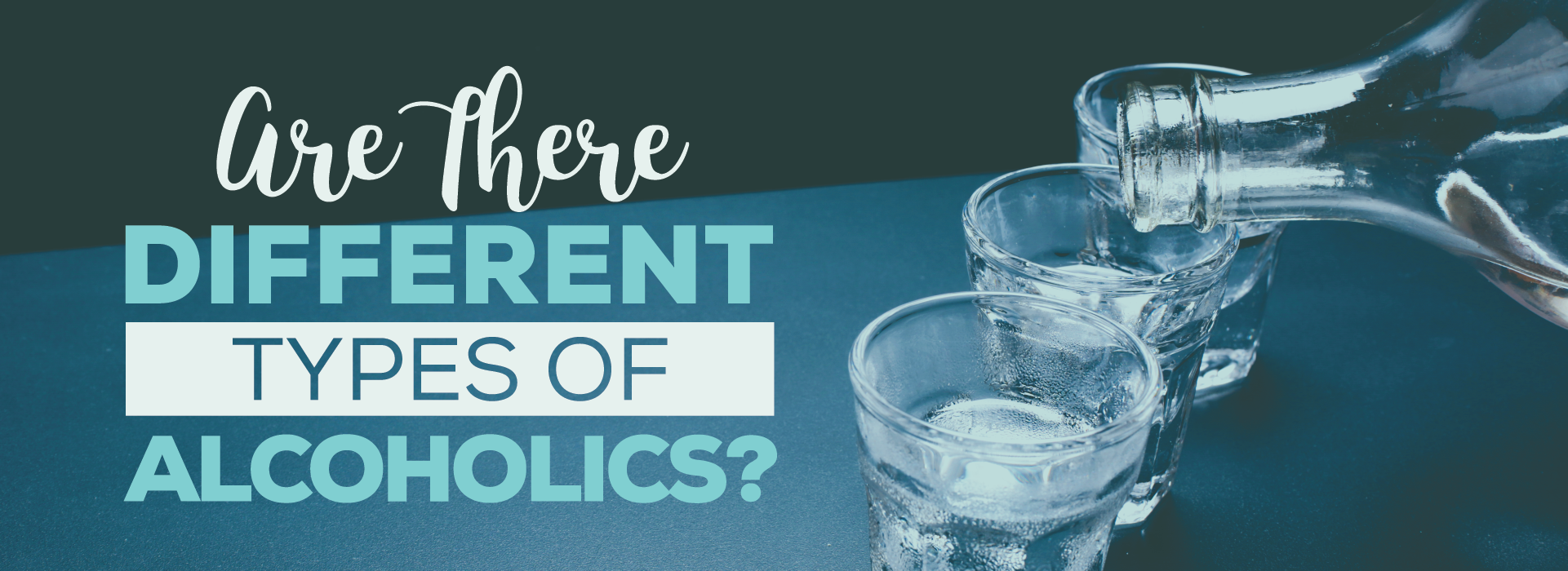
Some alcoholics fit the common stereotype: hanging out in bars at all hours of the day, losing jobs left and right, and neglecting responsibilities at home due to their alcohol consumption.
However, not all alcoholics actually fit this mold.
Some people who struggle with alcohol addiction may actually keep up with their responsibilities, maintain their appearances, and even have healthy relationships with friends and family. But even if they don't really match what most people think of as an alcoholic, they may still have a problem.
And in some cases, it can be difficult to even recognize the fact that you have an alcohol addiction at all. Some alcoholics are very good at hiding the signs and symptoms of their substance use disorder, while others may not even realize that they're struggling with dependency at all.
That's why it's so important to know that despite what popular culture says, there are actually many different types of alcoholics. And the more you know about each, the better able you'll be to spot the signs early and get the treatment that you or your loved ones really need.
There are five different subtypes of alcoholics according to recent research conducted by the National Institute on Alcohol Abuse and Alcoholism (NIAAA) : Young Adult Alcoholics, Young Antisocial Alcoholics, Intermediate Familial Alcoholics, Functional Alcoholics, and Chronic Severe Alcoholics.
The study itself, which has been peer-reviewed and was printed in the journal Drug and Alcohol Dependence in 2007, points out that these five subtypes replace the traditional model where alcoholism was a single indivisible type.
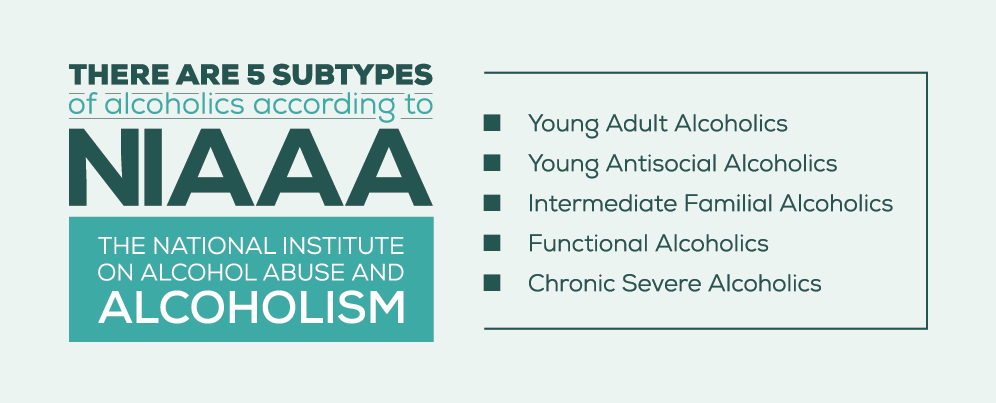
But it's important to remember that while these categories certainly break down the idea that all alcoholics fall into the same category, there is still going to be some overlap between these subtypes. Not everyone will solely be an Intermediate Familial Alcoholic or a Young Antisocial Alcoholic. And in most cases, individuals may be a little of each.
Without contest, Young Adult Alcoholics are undeniably the most common type of alcoholics out of any other subtype. And for most people, that probably comes as a bit of a surprise. After all, many of these drinkers aren't having a hard time holding down a job, aren't drinking their life away all hours of the day, and aren't even older than 30 in most cases.
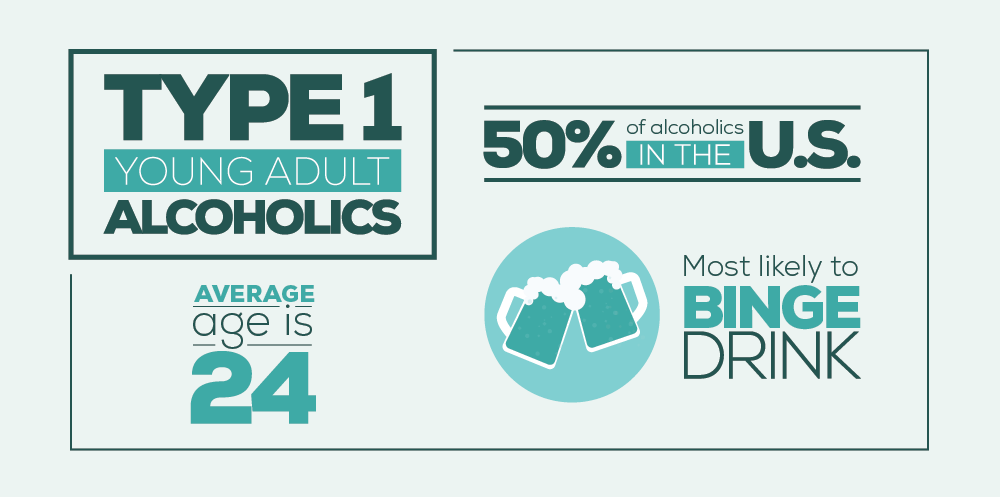
Beyond that, these types of drinkers have the lowest probability of getting in trouble with the law and are the least likely to have co-occurring mental disorders too.
However, Young Adult Alcoholics are also more likely to engage in hazardous behaviors like drinking than most other groups and also experiencing alcohol withdrawals.
Only about 54% work full time while 36.5% are in school part-time or full-time.
This is without a doubt the most common alcoholic type coming in at 31.5% of all alcoholics. And when you consider the fact that the next highest is 21.1%, the proportion of Young Adult Alcoholics is absolutely huge.
It's tough not to think about college drinking culture when you hear a statistic like that. As most people know, binge drinking during college years is incredibly common- and is in fact encouraged in most circles.
And this high rate of alcohol consumption has some pretty nasty consequences too. According to the NIAAA:
And when you add in the higher likelihood of alcohol poisoning and impaired judgement, college drinking can be one incredibly dangerous pastime.
Young Adult Alcoholics are especially at risk then.
This subtype is marked by a moderate probability of alcohol use disorders in family members (around 22%) and an especially low risk of comorbid psychiatric disorders. For instance, this group has a less than 1% probability of Anti-Social Personality Disorder, a moderate probability of cannabis and tobacco abuse, and a particularly low likelihood of having a mental disorder like depression and anxiety.
One of the most concerning aspects of this subtype of alcoholics is the fact that it has the lowest rate of seeking help out of any other type- only 8.7% of Young Adult Alcoholics actually try to get the treatment they need.
And when they do end up seeking help, most of them go through 12-step groups rather than through private professional or specialty treatment programs.
What Are the Signs of a Young Adult Alcoholic?
Recognizing the signs of this type of problematic drinker can be hard, especially when they're in an environment that supports this kind of risky drinking like college. But even so, there are a few things you can watch out for when it comes to spotting a Young Adult Alcoholic.
Some signs of a Young Adult Alcoholic may include:
This type of alcoholic can be especially prone to antisocial and dangerous behavior, run-ins with the law, developing additional mental disorders, and having overlapping substance use problems.
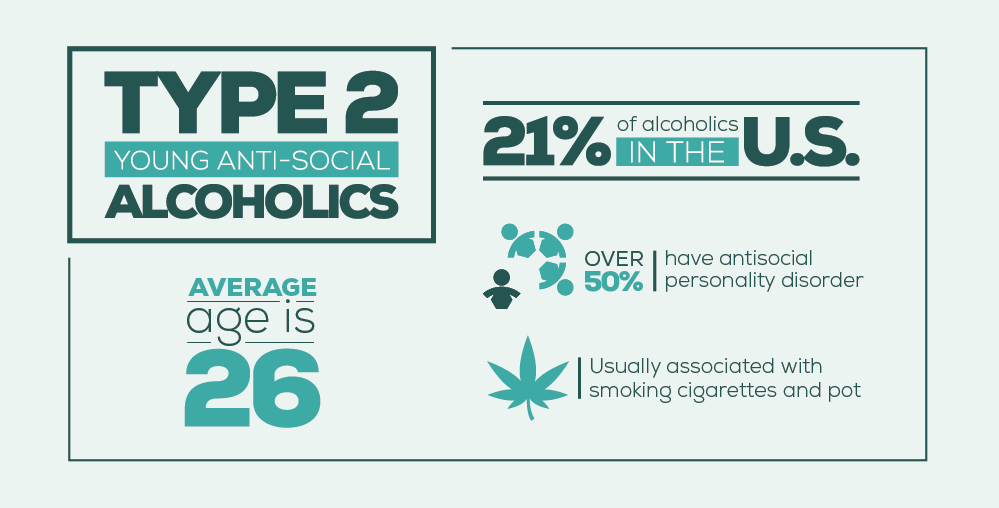
And given that this type of alcoholic is usually only in their mid-20s, it can set them on a path that is highly destructive both to themselves and to the people and things that they care about most.
The Young Antisocial Alcoholic is often around 26.4 years old but started drinking much earlier than others at around 15 years of age. Added to that, their problematic alcohol use disorder usually starts at about 18 years old.
While they don't have the highest frequency of drinking out of all the subtypes (Chronic Severe is higher), Young Antisocial Alcoholics tend to drink higher amounts more often than any other subtype- more than 5 drinks around 80% of the time with a maximum number of drinks in a single session at around 17.1 drinks.
Around 47% are employed full time while 13.4% are full-time students and the average family income for this subtype is about $32,000 per year.
Young Antisocial Alcoholics are actually the second most prevalent type of problem drinker, though it's close to Intermediate Familial and Functional Alcoholics. Around 21.1% of people who have an alcohol use disorder will fall into this subtype.
One interesting note about Young Antisocial Alcoholics is the fact that this subtype has the highest biological sex disparity of any other kind- about 76% are males, and only 24% are females.
One of the biggest differences between this subtype and Young Adult Alcoholics is the fact that a Young Antisocial drinker tends to have a much higher rate of drinking in their family and of experiencing mental disorders.
These types of alcoholics, for example, have a 52.5% probability of having a first and second-degree family member with an alcohol use disorder. Besides Chronic Severe Alcoholics, that makes this type the most likely to have an alcoholic home growing up.
But what really separates these types of alcoholics from others is the especially high rate of mental disorders compared to other groups. As far as lifetime co-occurring mental disorders go:
Added to that, this alcoholic subtype's likelihood of having overlapping addictions with other substances of abuse is also higher. They have a:
Thankfully, almost 35% of Young Antisocial Alcoholics actually seek help for controlling their drinking. Among this 35%, these types of alcoholics, according to the study, tend to "go to self-help groups, specialty treatment programs, and detoxification programs, and they have the highest rate of participation in treatment with individual private health care providers."
One of the main differentiators of this type of alcoholism is the fact that people who fall into this subtype are more prone to having antisocial behaviors. And given that many of these behaviors can also be quite jarring in real life, it often isn't hard to spot a Young Antisocial Alcoholic.
Some of the most obvious signs of this type of problematic drinker may include:
The following characteristics describe what it means to fall into the Intermediate Familial Alcoholic subtype:
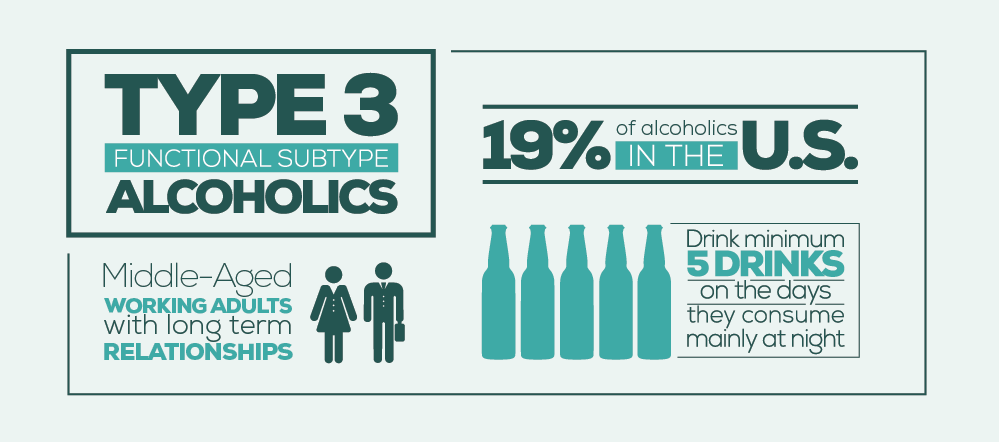
As you can see, it might be tough to pick out someone who is an intermediate familial alcoholic, especially when you put them side by side with a functional alcoholic.
However, there are some distinguishing factors that separate this subtype from the others.
This form of alcoholism usually consists of middle-aged drinkers who continue to hold a job and maintain family responsibilities, but often have higher rates of various mental illnesses. They also have a high rate of alcohol addiction in their family, but not as high as the Young Antisocial subtype.
This type of alcoholic makes up around 18.8% of all individuals with an alcohol use disorder- around 1 in 5. And while this may seem high, it's actually the second most uncommon type.
About 64% are males, and around 36% are females.
When it comes to familial and mental history, this is where Intermediate Familial Alcoholics stand apart from Functional Alcoholics specifically.
These types of drinkers often have much higher rates of family alcohol abuse than other alcoholics their age. According to study data, about 47% of them will have both a first and second-degree family member with an alcohol use disorder. The only category higher than that is the Young Antisocial Alcoholic by about 5%.
The risk of having a co-occurring mental disorder with this type is also elevated. Have a look at the lifetime stats below to get a better idea:
And as far as overlapping substance abuse disorders go, Intermediate Familial Alcoholics have:
Similar to the other alcoholism subtypes we've looked at so far, most Intermediate Familial Alcoholics won't end up seeking out help on their own. According to the figures from the study, only about 27% end up trying to get treatment, which puts it right in the middle as far as likeliness to get help compared to the other types.
For this class of problem drinker, individuals usually go to self-help groups, specialty treatment programs, detoxification programs, and individual private health care providers according to the study.
This type of alcoholic can be hard to distinguish from a functional alcoholic since they're both around the same age and both tend to be able to hold steady jobs. One of the main differences between the two, though, is family history and the tendency to have co-occurring mental disorders.
As a result, some of the signs to look for when judging whether or not someone is an Intermediate Familial Alcoholic are:
"An HFA is an alcoholic who is able to maintain his or her outside life, such as a job, home, family, and friendships, all while drinking alcoholically. HFAs have the same disease as the stereotypical "skid-row" alcoholic, but it manifests or progresses differently. Many HFAs are not viewed by society as being alcoholic, because they have succeeded and over-achieved throughout their lifetimes. These achievements often lead to an increase in personal denial as well as denial from colleagues and loved ones. HFAs are less apt to feel that they need treatment for their alcoholism and often slide through the cracks of the health care system, both medically and psychologically, because they are not diagnosed."
~ Sarah Allen Benton MS, LMHC, LPC
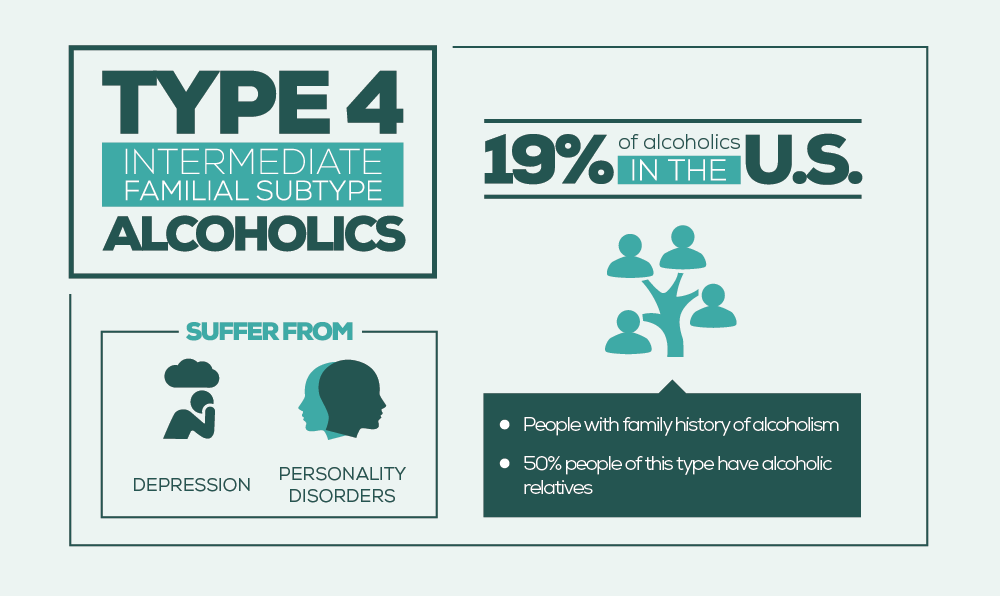
This type of alcoholic can end up being one of the most deceptive. That's because when you run through the list of characteristics you imagine an alcoholic won't have- a steady job, a solid education, a healthy family life- a functional alcoholic will often have all of them.
According to the NIAAA study, a functional alcoholic is usually middle-aged and developed a dependency problem later in life than most other subtypes, typically at around 37 years old. Around half of functional alcoholics are married, and most have full-time jobs with a mean family income of around $60,000 per year (the highest of the subtypes).
Added to that, more than 1 in 4 of functional alcoholics have a college degree or higher while less than 1% have legal problems as a result of their abuse (the lowest of the subtypes)
But despite just how "normal" these individuals appear to be, the truth is that a high-functioning alcoholic, also known as an HFA, is in just as much danger of ruining their lives as any other kind of alcoholic.
On the one hand, a functional alcoholic is still at risk of developing the numerous health problems associated with addiction. Just because you aren't showing the most obvious signs of being an alcoholic doesn't mean it isn't having a detrimental physical impact on your body.
Beyond that, a functional alcoholic's addiction isn't likely to go away without help. And that means that eventually their home life, career, and almost everything else that matters to them is going to be hurt by their alcoholism.
One of the most interesting things to come from the NIAAA study is the fact that functional alcoholism is actually quite common- more common than most people think.
According to survey data, about 1 in 5 people with an alcohol addiction (around 19.4%) meet the criteria for being a functional alcoholic. And just like every other subtype of this substance use disorder, this type of alcoholism is actually far more common than the typical alcoholic stereotype- the chronic severe alcoholic.
About 60% are males, and around 40% are females.
One point worth mentioning is that this subtype actually has the highest rate of retired individuals at around 5%.
A functional alcoholic has only a moderate degree of alcoholism in their family according to the study. The researchers stated that among this type of person with an alcohol addiction, there's only a 31% chance that either first or second-degree family members will have struggled with the same disease.
When it comes to mental history, functional alcoholics are unsurprisingly less likely than other subtypes to be afflicted by mental disorders. They have a normal rate of depression, a low rate of anxiety disorders, a less than 1% chance of Anti-Social Personality Disorder, and an especially low probability of having other substance use disorders.
Other than the Young Adult Alcoholic, functional alcoholics are actually the least likely to seek out treatment than any other subtype. According to the study, only about 17% actually end up asking for help with most participating in 12-step programs or getting treatment from a private healthcare professional.
Part of that might have to do with the fact that many functional alcoholics don't really believe they have a problem in the first place. They often believe since their life hasn't fallen apart around them that they have everything under control. This view is also reinforced by the fact that alcohol has become such an integral part of American life and that the only way you're a drunk is if you lose your job, house, and family because of it.
This, of course, is an enormous misconception about alcoholism.
While suffering repercussions in work and personal life is certainly a sign that alcohol abuse may have become an issue, this is not always the case. Most people think of an alcoholic as someone whose life is falling apart because of their alcohol use. But in fact, many individuals suffering from alcohol use disorder are known as functional alcoholics or high-functioning alcoholics.
Some of the most common signs of alcoholism include anti-social behavior, relationship issues, and even health issues. However, a high-functioning alcoholic may not exhibit any of these common symptoms. And that might make it a bit harder to spot them.
However, there are a few signs that someone you know may be struggling with functional alcoholism, including:
When most people think of a stereotypical alcoholic, this is the type they're imagining.
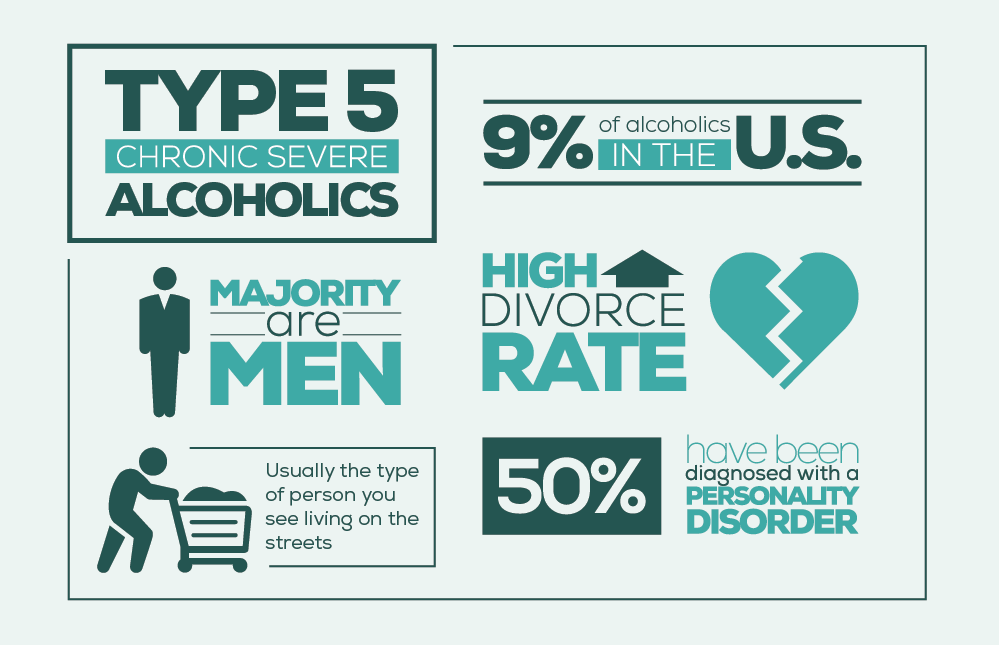
They may have a hard time holding down a job, don't have much of a family or home life to speak of, have had multiple run-ins with the law, and spend a good chunk of their day consuming drink after drink after drink.
They're mostly middle-aged and have had a long history of drinking uncontrollably, usually beginning their pattern of abuse early in their life before their twenties. The early onset of drinking is one of the best indicators for a likelihood of later-life alcoholism.
This subtype of alcoholism has the highest divorce rate, the lowest employment rate, and the highest day-to-day frequency of drinking than any other subtype.
Chronic Severe Alcoholics also report the highest levels of life impairment caused by drinking. For example:
Despite how common this conception of an alcoholic is in modern society, the truth is that these types of alcohol addicts really only make up about 9% of all alcoholics according to the NIAAA findings.
That means that less than 1 in 10 of all alcoholics live up to this stereotype.
About 65% are males, and around 35% are females.
Chronic severe alcoholics have the highest rate of family alcoholism out of any other subtype- almost 80% come from a family with a history of alcohol abuse problems.
This type of alcoholic also has the highest rates of psychiatric disorders as well. More chronic severe alcoholics also have Antisocial Personality Disorder than any other subtype besides the Young Antisocial subtype. Added to that, this type of problem drinker is also more likely to be struggling with depression, bipolar disorder, and anxiety disorders as well.
Plus, chronic severe alcoholics also are more likely to also have overlapping substance use disorders with cocaine, tobacco, marijuana, and opioids in addition to alcohol. And that can make it even more likely that they'll develop serious health problems at some stage of their lives.
While chronic severe alcoholics are often considered the most at-risk subtype, there is one admittedly small silver-lining to having this type of alcoholism: you generally recognize that you have a problem.
Since a chronic severe alcoholic will typically embody what most people imagine when they think of a drunk, they won't be as likely to deny their alcoholism as other subtypes. And as denial is often the biggest barrier to getting treatment, this type of alcoholic is actually more likely to seek treatment than any other subtype. Around two-thirds end up seeking treatment.
The study also points out that these types of alcoholics tend to receive treatment from "private physicians, psychiatrists, psychologists, social workers for treatment, and the highest rate of emergency room visits for help with their drinking."
Due to the severity and long-duration of an abuse problem in a chronic severe alcoholic, it's usually a bit easier to spot the signs of addiction in this subtype than any other.
Below are just some of the signs to be on the lookout for if you think someone you know or love is struggling with this type of alcoholism.
Maybe you've started thinking about your own binge drinking and how it's similar to that describing a Young Adult Alcoholic. Or maybe you've realized that just because you have a successful career and loving family doesn't mean you aren't a functional alcoholic after all.
And maybe, just maybe, all of this has got you wondering, Am I an alcoholic? And if this thought has popped into your head, congratulations! You've already gotten further along than many alcoholics simply by considering this possibility.
In fact, denial is so rampant among addicts that a whopping 96.7% of alcoholics don't seek treatment simply because they don't think they really have a problem according to national surveys.
And without proper treatment, alcoholism can continue to ruin your life for years and even decades.
That's why being able to recognize the signs of an alcohol addiction in yourself is the first step to preventing a serious problem from getting any worse. The tools below will help you spot these signs early on and learn to look past denial and accept the truth about your addiction.
Online Addiction Quiz- One of the quickest ways of getting a good idea of whether or not you're an alcoholic is by taking this short online alcohol addiction quiz. Not only does it take just a few minutes to complete, but it can also actually give you the push you need to finally seek help and treatment.
NIDA Self-Assessment Tools- The self-assessment tools provided by the National Institutes on Drug Abuse are clinical assessment measures used by addiction professionals in evaluating whether or not a patient is struggling with a substance use disorder. They range in complexity from tests that only take a few minutes to complete to more comprehensive questionnaires that take a deeper dive into addiction.
DSM-V Diagnostic Criteria- Part of the Diagnostic and Statistical Manual of Mental Disorders, these diagnostic criteria for a substance use disorder are actually used by practicing physicians and psychiatrists around the world. If you've experienced at least two of these scenarios in the past 12-months, you're likely dealing with a serious substance abuse issue.
A Professional Assessment- Last but not least, consulting a professional about whether or not you're showing signs of being an alcoholic is one of the best ways of answering once and for all, Am I addicted to alcohol? These types of assessments will give you the opportunity to ask questions, get clarification, and have a truly personalized experience in determining your level of addiction.

Beyond merely recognizing that there are different types of alcoholics, it is also important to realize that overcoming alcoholism takes years, not just days. Knowing that a recovering alcoholic needs to stay away from the substance altogether can help you overcome substance abuse or support those around you on the road to recovery.
A recovering alcoholic can certainly transition into becoming a recovered alcoholic. However, this process can take years- and sometimes even decades. And while it might be helpful to categorize someone as a specific type of alcoholic in the beginning, it's important to show support in whatever way they need to recover.
And even more importantly, overcoming alcoholism of any type is going to be the most successful when it's done with the help of a professional treatment program.
That's where Northpoint Seattle comes in.
"When you're sober, it's so easy to tell yourself you'll have just one drink. Or if you're trying to be honest with yourself, you say you'll stop at two; maybe two is enough to feel it, but not enough to have any consequences. But what happens when you finish that second drink? How do your sober intentions hold up against the reality of that buzz waiting just inside the fridge or on the shelf? In short, can you really stop at one or two or does that one drink wreck any willpower you had earlier in the evening until you finish the rest of the alcohol in the house...and go looking for more?"
~ Richard Taite, writing for Psychology Today

No matter what kind of alcoholic you are, Young Adult, Young Antisocial, Intermediate, Functional, or Chronic Severe, Northpoint Seattle can help you overcome your alcohol abuse problem and attain sobriety.
Our Intensive Outpatient Program (IOP) in Bellevue, Washington is the perfect option for anyone struggling with alcoholism but doesn't have the time to commit to full-blown inpatient rehabilitation. We offer the highest quality alcohol rehab services in the area and use only individualized plans that are crafted to meet your individual needs- no cookie-cutter programs here.
And when you partner with Northpoint Seattle, our knowledgeable and friendly staff will be there to help you get the absolute most out of your treatment and cheer you along every step of the way.
You don't have to live a life enslaved to your addiction. You can recover. And you will- with Northpoint Seattle.
So, get in touch with us today. Because the only healthy type of alcoholic is a former alcoholic.

Our admissions coordinators are here to help you get started with treatment the right way. They'll verify your health insurance, help set up travel arrangements, and make sure your transition into treatment is smooth and hassle-free.
888.483.6031Contact Us